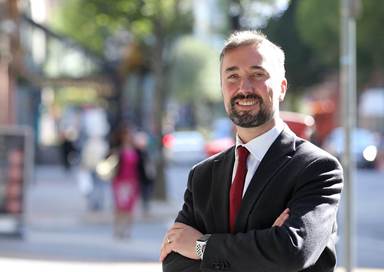Covid threatens the survival of our city centres. To meet the challenge Belfast must adapt.
As we enter Autumn the darker nights seem to act as a metaphor for enveloping gloom. Across the island a second wave of Covid inflicts misery on thousands of households, while in its wake rolls a slow-moving tsunami of economic carnage.
Over the last quarter the Irish economy slumped 6.1 per cent - the biggest fall on record - with large urban areas suffering most. Business Group Dublin Town have indicated the city centre is at risk of terminal decline, and repercussions from closures could be felt for decades to come. Much of Dublin’s recent success has been built on foreign direct investment, with tech firms making up half of new offices. The recent withdrawal of Google from a 200,000 sq ft HQ symbolises this sudden reversal of fortune.
VISION: Chris McCracken, manager of the Linen Quarter Business Improvement District

The reluctance of workers to return to their offices has also hit urban centres hard, particularly retail and hospitality which relies on this trade. Ulster University has estimated this will cause at least £200m in lost business for Belfast alone. With ongoing pressures, from crippling rates to the growth of online, is it possible that Belfast is also entering a period of terminal decline?
There is no doubt that Covid represents a major inflexion point in Belfast’s evolution, but if the city can learn to adapt then the challenge can also become an opportunity.
First, we need a much more significant focus on residential. People are the living, breathing heart of Belfast and their demands help drive the local economy. We need to create new homes and communities within the city centre, including the schools and facilities that support them. The idea of a 15-minute city, where all key services are in walking distance, is rapidly gaining ground.
As part of this philosophy we need to remove most private cars from the city core, and regenerate streets for green and social space; public transport, cycling and walking. As well as improving wellbeing this will reduce air pollution, which is currently killing more people each year than the pandemic.
Third, we need to repurpose retail space. There is still an important place for local shops, but the vacancy rate is already high, and the market is likely to contract further. To maintain a sense of destination we need to consider new forms of entertainment, such as small cinemas, indoor golf, escape room, gaming pavilions, and arts and cultural attractions. Belfast City Centre should re-invent itself as an innovative social space, with retail just one facet of the mix.
During lockdown, many Linen Quarter based organisations continued to provide vital frontline services to the public. From doctors to transport workers, cleaners to charity volunteers, we are proud to call them our LQ Lockdown Legends. Thanks to all involved! #linenquarter pic.twitter.com/Iie4E7x9l4
— Linen Quarter BID (@LinenQuarterBID) September 11, 2020
This new approach needs to go hand-in-hand with a fundamental reform of business rates. The amount of money high street business pays compared to online operators is unfair and unsustainable. To help our city centres evolve, and to support the thousands of jobs they maintain, we need a radical rethink on taxation.
Finally, we need to re-invent our offices as hubs of creativity, innovation, and social culture. Employee wellbeing should be at the heart of future offices, with activity supported by enhanced technology and collaborative spaces. This should be accompanied with greater investment in tech friendly places: flexible offices for start-ups and scale ups, offering shorter leases and meeting points to share ideas between companies and not just within them.
The short-term future is challenging, but if our city centres can adapt they will not just survive the pandemic, but thrive in a new era of people focused prosperity.
Christopher McCracken is Managing Director of the Linen Quarter BID.
He will be joining a panel on the future of our city centres at the Belfast Homecoming Conference, 1-2 October.




